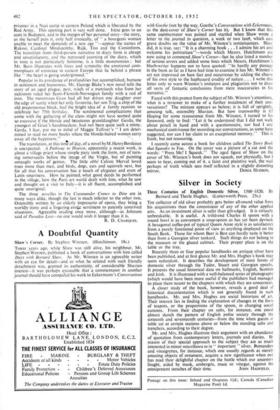Silver in Society
THE collector of old silver probably gets better all-round value from his acquisitions than the connoisseur of any of the other applied arts. As an investment silver is safer than gilt-edged. It is virtually unbreakable. It is useful. A trifid-end Charles II spoon with a round bawl is as convenient a soup-spoon as has yet been devised. A hexagonal coffee-pot of typical Queen Anne style is as satisfactory from a purely functional point of view as anything displayed on the South Bank. Those for whom Beer is Best can hardly taste it better than from a Georgian silver tankard. Such things do not belong to the museum or the glazed cabinet. Their proper place is on the table or the tray.
Recently three or four popular handbooks on antique silver have been published, and at first glance Mr. and Mrs. Hughes's book may seem redundant. It describes the development of most forms of domestic silver through the Tudor, Stuart and Georgian epochs. It presents the usual historical data on hallmarks, English, Scottish and Irish. It is illustrated with a well-balanced series of photographs (which would have been more useful if the publishers had managed to place them nearer to the chapters with which they are concerned).
A closer study of the book, however, reveals a good deal of historical documentation which is not generally found in such handbooks. Mr. and Mrs. Hughes are social historians of art. Their interest lies in finding the explanation of changes in the form of teapots, or the proportions of the spoon, in changing social customs. From their chapter on salts, for instance, one could almost sketch the pattern of English polite society through the sixteenth and seventeenth centuries—from the time when guests at table sat at certain stations above or below she standing salts and trenchers, according to their degree.
Mr. and Mrs. Hughes illustrate their argument with an abundance of quotation from contemporary letters, journals- and diaries. By reason of their special approach to the subject they are as much interested in minor miscellanea as in" important " silver. Pomanders and vinaigrettes, for instance, which one usually regards as merely amusing objects of ornament, acquire a new significance when one has read their delightful chapter on the battle which our ancestors fought, aided by musk, ambergris, mace or vinegar, against the omnipresent stenches of their time. JOHN HADFIELD.


































 Previous page
Previous page